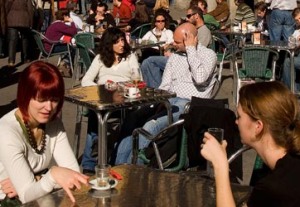Cost of living in Spain
One of your most important questions when coming to Spain is probably how much money will you need in your everyday life. Although the average monthly expenses of a student are about €900-1,000, prices (especially housing) vary quite a lot depending on the place you choose (and if you choose a shared flat, a hall of residence, etc.)
Prices are higher in large cities, especially in the city centre.
We recommend, therefore that one of the first decisions you make when coming to Spain is where you are going to live, and how far your home is from the university, because according to a recent survey by Eurostudent, the cost of housing in Spain usually accounts for 40% of students’ budgets, and transport takes up 7%.
Don’t forget food, class materials, leisure, mobile phone and housing bills (electricity, water, internet, etc.).
For the rest of your needs, here is a list of average prices, by way of guidance. Remember that prices are higher than average in large cities:
Coffee: €1.25
A full breakfast: €2-4.
Soft drink or beer: €2.
Loaf of bread: €0.70.
A set menu in a normal restaurant: €10-15.
A single ticket for the bus or underground: €1.35.
10-ride pass: €9.
Monthly pass : €40.
Newspaper: €1.20 (more expensive on Sundays)
Cinema ticket: €7.
Internet connection: €40 a month, approx.
Things to remember
The most economical option when choosing housing is usually a shared flat. The rent is usually paid within the first five days of each month and when you get there you will have to pay a deposit, which will be returned to you when you leave if everything is in order.
University restaurants usually offer very economical meals.
In Spain it is not compulsory to leave a tip like other countries, but it is common in hotel and catering services (hotels, restaurants, bars).
Some university campuses and public libraries have free Internet connection.
Some establishments have book exchange initiatives, especially in large cities.
Get information on student discounts when you go to visit monuments, museums, cinema, etc. You can also go to the film archive.
As well as going to a language school, to learn Spanish you can find places for language exchange in large capitals. This way you will be able to speak the language you want free and it is a fun way of meeting people and having coffee or a glass of wine.
To avoid unnecessary costs make sure your mobile phone has roaming activated or rather buy a Spanish prepaid or contract mobile phone. If you are going to stay in Spain for a year at least, it is probably better to get a contract phone. When you apply, bear in mind that many operators have offers for students. If you buy a card for international calls, make sure it works for you country. Another increasingly popular option to call abroad is using certain online applications such as Google Talk or Skype. If you can’t access the internet easily, you can go to a phone centre where you will be charged per minute.
For everyday travel, get information on the price of a young people’s pass or similar. For longer trips, if you go by train, take your Youth Card and bear in mind that there are different international passes with discounts:
1. InterRail, for European residents, enables you to travel round 30 countries in first or second class.
2. Eurail, for residents outside Europe, the Russian Federation and Turkey.
3. RailPlus, a card with your name on it for European residents.







